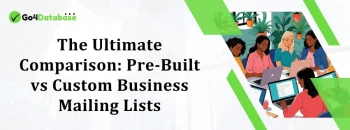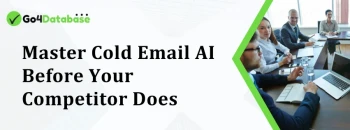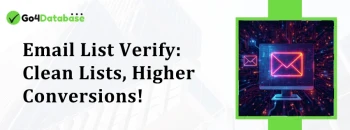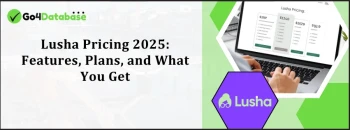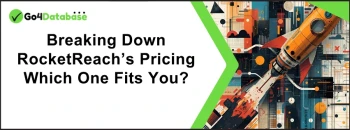To survive (and thrive), every business needs a good amount of new leads, which will keep their sales team busy and help them to push their revenues higher and higher.
Finding new business leads isn’t an easy task, though.
To uncover them, businesses must adopt a range of lead generation techniques, and they’ll have to know when to buy leads and how.
It’s often essential to the very survival of their business. But fear not! This blog (and ofcourse me!) are here to help you buy leads list.
Table of Contents: Buy Leads
1. Introduction: Why should you Buy Leads
2. What to Look For in a Lead Provider when you Buy Leads
3. Top 10 Websites to Buy B2B Leads in 2025
4. Comparing the Platforms: Who Offers What?
5. Common Mistakes When Buying Business Leads
6. FAQs: Buying Leads for B2B Sales in 2025
Introduction: Why should you Buy Leads
TL;DR
Buying leads in today’s fast-paced market is essential to grow your sales pipeline beyond just organic methods. It helps you expand into new markets, build your brand following, gather valuable customer reviews, and boost revenue by targeting qualified prospects. Lead generation also creates new business opportunities, improves lead quality, builds visibility, reduces cold outreach, and automates lead management with smart tools. In short, buying leads strategically is a powerful way to speed up growth and stay competitive in 2025.
In today’s fast-paced, highly competitive business environment, acquiring high-quality leads has become more critical than ever.
For many businesses, relying solely on organic methods like inbound marketing, referrals, and networking simply isn't enough to sustain a healthy sales pipeline.
That's where buying email leads comes in a strategic move that can save time, reduce costs, and expedite growth.
As we approach 2025, the landscape of B2B sales has evolved.
Traditional sales tactics like cold calling and door-to-door prospecting are rapidly being replaced by more efficient, data-driven methods.
With advancements in lead generation tools and intent data, businesses can now target highly qualified business leads who are not only interested but ready to convert.
But why should you buy leads, and how do you do it effectively?
1. Expand Your Market
When you started your business, you likely targeted a specific group of people.
But is this the only sector you can and should be targeting? Lead generation enables you to learn about your prospects.
Maybe you’re getting engagement from companies and job roles not included in your marketing campaigns. With lead generation, you’ll see this trend and can add them.
Now, you have the opportunity to expand into new markets you otherwise wouldn’t have.
2. Grow Your Following
Content creation and communication are a big part of lead generation efforts.
It consists of crafting quality content and starting conversations on social channels.
The goal is to share valuable content with your target audience, so as to position you as a thought leader in the industry.
In turn, this builds a community of professionals who like and follow your brand.
Some will become customers and even more may turn into brand advocates. And who couldn’t use more of those?
3. Gather More Customer Reviews
Social proof is everything when it comes to convincing prospects to convert into customers. And there’s no better form of it than a review from a past client.
But you don’t always get these automatically (even when your product or service is excellent). So it pays (literally) to ask your customers for testimonials and reviews.
You can then use this within your marketing collateral, such as your website, emails, videos, social media posts, and infographics.
4. Boost Your Revenue
When done correctly, sales lead generation can maximize your brand’s ability for reaching target prospects.
This requires using the right messaging, offer, and content to generate interest from these specific groups.
In doing so, you’ll find it easier to capture the attention of qualified leads, which makes it easier for sales to convert them.
The revenue growth potential is great, especially when you’re focusing on interests and pain points your audience cares about.
5. Generate Business Opportunities
Lead generation doesn’t only help with finding prospects. It can also present business opportunities.
Maybe a non-competing brand in your industry reaches out to host a webinar together. And by teaming up, you gain access to their audience (and vice versa).
It’s a mutually beneficial partnership that can lead to well…more leads.
6. Improve Lead Quality
Creating content and putting it onto the web can get you traffic. Maybe even a ton of it.
But if your visitors aren’t converting into leads, then it’s a wasted effort. With lead generation, you’re taking a highly targeted email list approach to content creation.
Also Read: Go4database Buying Guide: Choose a Targeted Email List That Works for You
Everything you write for your brand from the website and email copy to social media and blog posts needs to cater to these specific groups.
This makes it easier to create topics and messages that feels right with each audience.
And by doing this, you’ll improve the quality of your leads, which improves conversions and sales.
7. Build Visibility and Awareness
Maybe you’re a startup that recently launched without much popularity. Or you’re an established business that’s operated behind the scenes for years.
And now you want to get more eyes (and wallets) focused on your company. Creating visibility and awareness is vital to turning the tide in your favor.
You can do this by creating content your audience cares about and sharing them on the channels they frequent.
8. Eliminate or Reduce Cold Calling (and Emailing)
When you have hot leads coming to you, why continue using unnecessary outbound methods like cold calling and emailing?
This will free up the time of your salespeople so they can focus on closing more deals with leads they know want your product.
9. Automate Lead Management
There are now software tools you can use like to automate lead generation and various management processes.
This includes tools like email marketing software, CRMs, and customer data platforms (CDP) and Sending Platforms.
By implementing them into your lead generation strategy, you can simplify and fasten your pipeline.
For example, your CDP captures information about leads. Then leads are segmented into a nurturing campaign carried out by your email marketing tool.
Then your CRM keeps track of all communications between leads and your business.
By making these tools accessible to marketing, sales, and customer support teams, you can coordinate data and initiatives.
What to Look For in a Lead Provider When You Buy Leads
When you decide to buy leads, choosing the right mailing list provider is critical.
Not all providers offer the same quality, accuracy, or customization, which can directly impact your conversion rates and overall sales performance.
Here are the key factors to keep in mind when choosing a lead provider:
1. Lead Quality & Accuracy
The foundation of a successful buy leads strategy is the quality of the leads you purchase.
Ensure that the provider offers accurate and up-to-date and fresh data.
Low-quality leads can waste time and resources, so always ask about the frequency of data updates, as well as the process used for verifying lead information.
You should also confirm if the leads are targeted based on your specific business needs, such as industry, company size, location, or decision-maker role.
2. Compliance with Data Privacy Laws
In today’s world, you know compliance is crucial. Ensure the B2B data provider follows GDPR, CCPA, and other relevant data protection regulations.
Your business could face serious consequences if you buy leads from sources that don’t adhere to legal standards.
A good lead provider will be transparent about how they collect, store, and manage customer data.
3. Lead Segmentation & Customization
One common approach to leads is outdated.
Look for providers who allow you to segment and customize the leads based on your specific requirements whether it’s B2B contact list providers, buyer intent, or industry verticals.
Also Read: Top 7 B2B contact list providers in USA
This segmentation ensures you're getting leads that are more likely to convert, making your outreach more efficient and targeted.
4. Integration with CRM & Marketing Tools
A good workflow between your lead provider and your existing systems is essential for smooth operations.
Check if the lead provider integrates with CRMs like Salesforce or HubSpot, as well as marketing automation tools.
This integration makes it easier to import lead data directly into your sales and marketing systems, saving you time and preventing manual errors.
5. Lead Enrichment Features
Lead enrichment can significantly improve your ability to engage with leads.
A good provider will offer lead enrichment services, which add extra data points like company size, social profiles, and job titles to your leads.
This data can help personalize your outreach and increase the chances of converting the lead into a customer.
6. Transparency & Customer Support
Lastly, you want a lead provider who is transparent about their processes, pricing, and lead guarantees.
Additionally, excellent customer support is essential.
Whether you have questions about the lead data or need assistance with integration, your provider should offer responsive and knowledgeable support to help you maximize the effectiveness of your lead purchase.
Top 10 Websites to Buy B2B Leads in 2025
In 2025, the market for buying B2B leads is more competitive than ever.
To help you navigate the options, we've compiled a list of the top 10 websites that offer high-quality leads.
Whether you're looking for B2B contact data, intent data, or lead enrichment, these platforms can give your sales team the tools they need to grow.
1. Go4Database
Go4Database is a trusted name when it comes to providing top-quality, active and specific B2B leads.
At Go4Database we offer a wide variety of business contact lists that you can customize based on your exact needs whether you're targeting a specific industry, location, company size, or job role.
Our leads are accurate, specific, and verified to help your sales and marketing teams reach the right decision-makers faster.
You don’t have to waste time chasing leads that are dead.
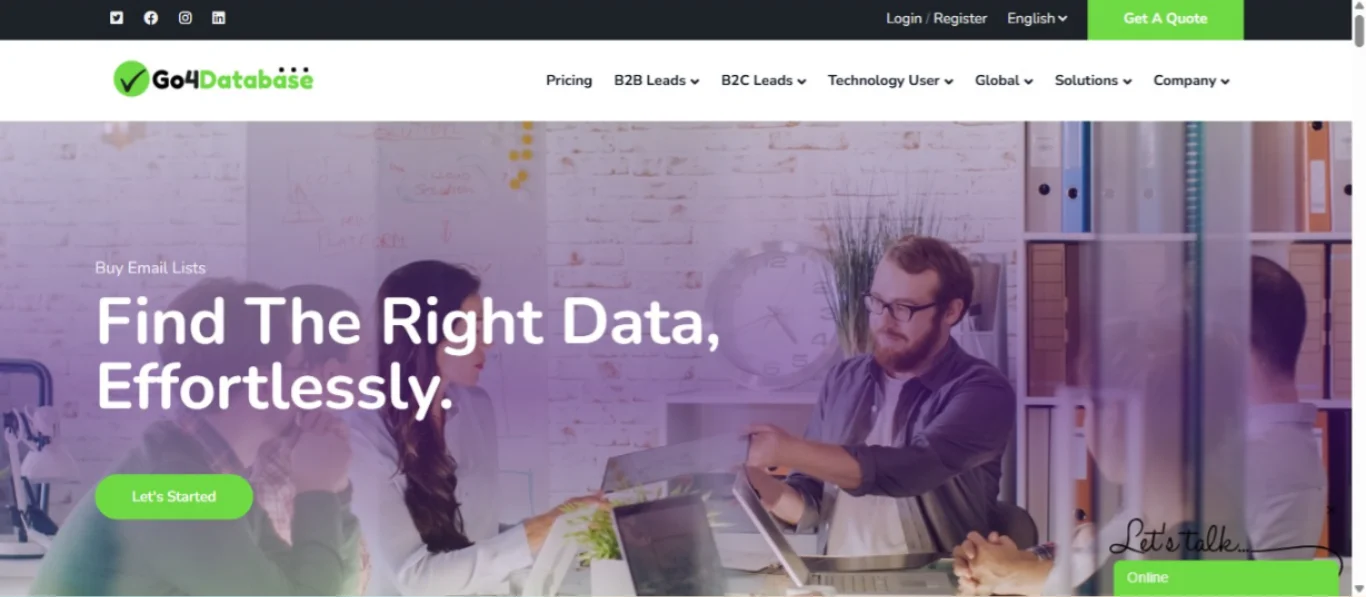
Here’s what makes Go4Database stand out:
- Customized lead lists – Filter leads by industry, location, job title, revenue, and more.
- Verified contact data – Every lead goes through a quality check to make sure phone numbers, emails, and other info are real and active.
- Lead enrichment – We don’t just give you names, we provide detailed company information, social profiles, and more to help you build meaningful conversations.
- Easy integration – Our data can be easily exported and used with your existing CRM or best email finder tools.
- Dedicated support – Our team is always here to help you choose the right data and make the most of your campaigns
Whether you're a startup looking to grow or an established company scaling your outreach, Go4Database gives your sales team the fuel it needs to convert faster and smarter.
2. UpLead
Uplead is a lead generation platform that makes it simple for businesses to find the right contacts and enables you to buy leads for your business.
The platform gives you access to 140+ Million B2B contacts across a range of industries, including real estate, SEO, web design, software, construction, and more.

Build targeted lists using high-quality verified data. Search through specific contacts and companies. Enrich and enhance your own data.
Also Read: Uplead vs. ZoomInfo: Which B2B Contact Data Providers Fits You Well?
3. ZoomInfo
ZoomInfo is a sales intelligence tool for companies which gives you real-time information on over 130 million contacts and 105 million businesses.
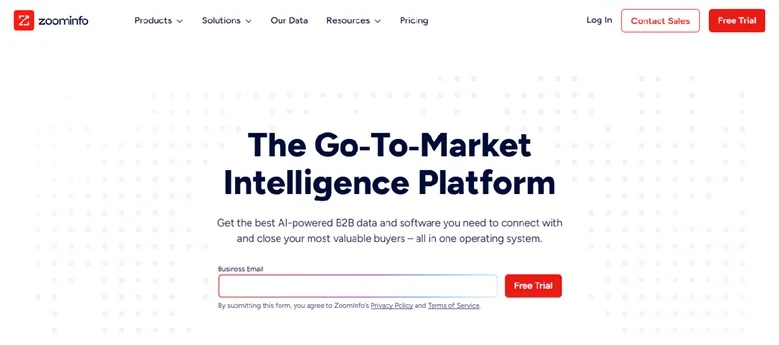
Contact database with over 321 million contacts. Advanced search features including intent data. Tools for automating sales workflows.
Complex pricing. Long setup process. High cost. User experience issues
It’s a powerful tool for any business that wants to grow faster and reach more potential customers without wasting time.
4. Apollo.io
Apollo is a sales automation tool for lead gen and engagement. It’s an AI driven solution and users choose to buy B2B sales leads from Apollo, thanks to access to over 270 million contacts. It finds the right buyers and closes deals with its sales engagement and auto sequences.
Simple interface to navigate and use. Integrates with LinkedIn and Gmail. Email sequencing and analytics to optimize outreach.
Sometimes data accuracy issues. UI can be cluttered for some users. Limited analytics.
Also Read: Looking Beyond Apollo.io? Here are 11 Alternatives!
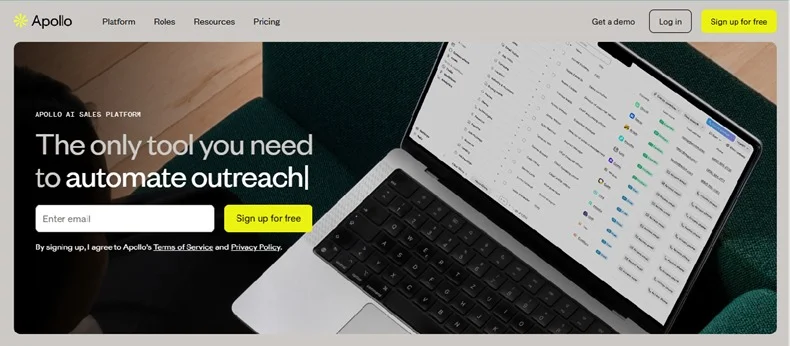
5. Lusha
Lusha offers B2B contact information for marketing and sales professionals. The platform prides itself on offering a range of data points and integration with platforms such as Salesforce.
Smooth integration with LinkedIn Sales Navigator. Possible to update existing contact records.
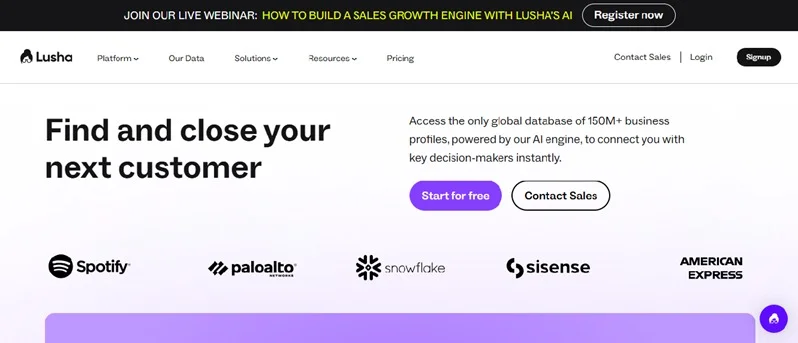
Occasional glitches require a reload. Data accuracy is sometimes an issue.
6. Lead411
Lead411 provides accurate and up-to-date contact information for businesses in various industries.
It specializes in sales intelligence, allowing companies to track the latest developments and identify high-intent leads.

With options for lead scoring and CRM integration, Lead411 ensures your sales efforts are as targeted as possible.
7. Cognism
Cognism gives you lead data that’s ready to use and follows all the rules.
Cognism gives you verified business emails and accurate phone numbers to connect with the right people.
It works well with big CRM and sales tools like Salesforce and HubSpot.
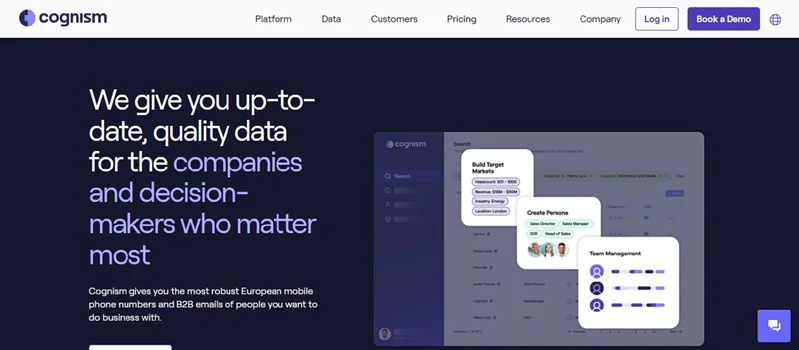
The tool makes it easy to manage and use the data. Cognism also spots accounts ready to buy so you can focus your outreach for better conversion rates.
It uses AI and intent data to find businesses that are most likely to need what you offer, so you can reach out at the perfect time.
Cognism also helps improve your contact lists, making it a great tool for sales teams who want to find more leads, faster.
8. Salesfully
Salesfully offers an easy-to-use platform for buying targeted B2B leads.
Salesfully is a B2B and consumer-lead purchasing platform that focuses primarily on the USA.

With features like email verification and advanced search filters, Salesfully helps businesses find leads that match their ideal customer profiles.
It also provides access to relevant contact data to ensure your outreach efforts are both efficient and effective.
9. Seamless.AI
Seamless.AI helps businesses find real-time leads using AI-powered search tools.
Its clean, up-to-date data allows you to identify prospects across industries, making it a great platform for businesses looking to expand their reach.

Seamless AI is a real time search engine for B2B companies to find sales prospects.
It simplifies lead gen by giving you current contact info through instant web crawling and AI driven data collection.
It works with CRMs like Salesforce and has a Chrome extension so it’s the easiest for sales pros.
10. InfoUSA
InfoUSA gives you detailed B2B lead lists with verified contact info you can trust.

You can filter leads by industry, location, or company size, so it’s easy to find exactly who you’re looking for.
They also offer data enrichment and custom lead lists, making it a good option for both small businesses and large sales teams.
Whether you're just starting with lead generation or you're looking to grow fast, these tools can help you find the right B2B leads in 2025.
Go4Database takes the lead by offering highly accurate, personalized, and enriched leads perfect for businesses that want real results.
Comparing the Platforms: Who Offers What?
When choosing a platform to buy B2B leads, it’s important to understand what each one offers in terms of features and capabilities.
Here’s a comparison of the key platforms mentioned above to help you decide which one fits your business needs best.
| Platform | Lead Data Quality | CRM Integration | Real-Time Data Verification | Intent Data | Intent Data |
| Go4Database | High-quality, customized B2B data | Yes (Various CRMs) | Yes | Industry, Job Title, Geography | Custom Pricing |
| UpLead | Verified B2B contact data | Yes (Salesforce, HubSpot) | Yes | Industry, Company Size, Job Title | Starts at $99/month |
| ZoomInfo | Vast, up-to-date database | Yes (Salesforce, HubSpot) | Yes | Company Insights, Job Role, Revenue | Custom Pricing |
| Apollo.io | 200+ million business contacts | Yes (Various CRMs) | Yes | Industry, Job Role, Company Size | Starts at $99/month |
| Lusha | High-quality B2B contact data | Yes (Salesforce, LinkedIn) | Yes | Job Role, Industry, Location | Starts at $39/month |
| Lead411 | Accurate, up-to-date data | Yes (Various CRMs) | Yes | Industry, Company Size, Geography | Custom Pricing |
| Cognism | Compliance-ready, AI-driven | Yes (Salesforce, HubSpot) | Yes | Industry, Company Size, Job Role | Custom Pricing |
| Salesfully | Verified B2B data | Yes (Various CRMs) | No | Job Title, Company Size | Starts at $39/month |
| Seamless.AI | Real-time, AI-powered data | Yes (Salesforce, HubSpot) | Yes | Industry, Company Size, Job Role | Starts at $99/month |
| InfoUSA | Verified B2B lead lists | Yes (Various CRMs) | Yes | Industry, Geography, Revenue | Custom Pricing |
Key Features Explained:
Lead Data Quality: How accurate and reliable is the data?
Most platforms offer verified or real-time data, but some also ensure compliance and data enrichment to fill in gaps.
Lead Enrichment:This feature allows you to enhance basic contact information, helping to create more personalized outreach.
It’s available on most platforms like Go4Database, Lusha, and Lead411.
CRM Integration: A key feature for aligning lead data directly with your sales process.
Integration with popular CRMs such as Salesforce, HubSpot, and LinkedIn is available on several platforms, including Lusha, Seamless.AI, and Apollo.io.
Customizable Filters: The ability to segment your leads based on specific criteria like company size, industry, and job title can help ensure your outreach is highly targeted.
All platforms provide this, but some offer more granular options.
Real-Time Data Verification: Platforms like UpLead and ZoomInfo excel in this area by providing up-to-date, verified data that helps avoid outdated leads.
Intent Data: If you’re looking for leads showing signs of interest or intent to purchase, platforms like ZoomInfo, Cognism, and Seamless.AI offer intent data to help you target prospects more effectively.
Segmentation Options: The more you can segment leads, the more effective your sales outreach will be.
Most platforms provide advanced segmentation by industry, company size, job title, and location.
Price Range: Pricing varies across platforms, often based on the level of customization, the number of leads required, and the features available.
Some platforms, like Go4Database, ZoomInfo, and Cognism, offer custom pricing based on your specific requirements, while others have subscription plans starting as low as $39/month (e.g., Lusha, Salesfully).
Final Thoughts:
Choosing the right lead generation platform depends on your business size, budget, and the level of detail needed for your outreach.
Go4Database is ideal if you're looking for highly customized and enriched data, while UpLead and ZoomInfo excel in providing verified, real-time contact information.
For AI-powered insights, Apollo.io, Seamless.AI, and Cognism stand out.
If you're looking for easy-to-use tools with direct access to decision-makers, Lusha might be your best bet.
By comparing features and prices, you can select the platform that aligns with your sales goals and growth strategies for 2025.
Common Mistakes When Buying Business Leads
Buying business leads is a crucial part of growing your company, but it’s not a process without its challenges.
Many businesses make mistakes that can result in wasted resources and missed opportunities.
TL;DR
When buying business leads, avoid these mistakes don’t skip defining your target audience or focus only on quantity over quality. Use data enrichment and segment your leads properly. Exclude irrelevant audiences and leverage intent data to find ready buyers. Integrate leads into your CRM and use automation to streamline outreach. Always ensure compliance with data laws and track your results to improve. Following these tips means smarter spending and better conversions.
Here are some common mistakes to watch out for when purchasing B2B leads.
1. Not Defining Your Target Audience
One of the biggest mistakes businesses make when buying leads is failing to clearly define their target audience.
Without a well-defined audience, it’s difficult to ensure the leads you’re purchasing will actually convert.
Even with the greatest lead generation tactics in place, your ideal user is unlikely to convert if they feel that you are not capable of addressing their pain point and offering something to overcome this.
By taking the time to gain an understanding of your target audience, what issues they face and how your business can help them remedy these obstacles, you will have the ability to make this a focus point within your strategies.
You need to know the industry, company size, geography, and job titles that are most relevant to your business to ensure you’re investing in the right leads.
2. Relying Only on Quantity Over Quality
It’s easy to get caught up in purchasing large quantities of leads, but quality should always be your priority.
Buying huge lists of low-quality, outdated, or irrelevant contacts can lead to a poor return on investment.
Your priority should always be verified and enriched data to make sure the leads you’re acquiring are highly targeted and have a real chance of converting into customers.
3. Ignoring Data Enrichment
Data enrichment is the process of enhancing lead data with additional, valuable information.
Ignoring this can result in a lack of context about your leads, making it harder to personalize outreach and effectively nurture leads.
Platforms like Go4Database and Lusha offer data enrichment services, which can be crucial to maximizing the value of the leads you buy.
4. Not excluding audiences
Failing to exclude audiences within sections of your strategies is one of the main lead generation mistakes that can negatively impact your conversion rate, as well as customer perception of your business.
Excluding specific advertising allows you to refine your audience targeting and present yourself to segments that are most aligned with a certain campaign ad, and therefore more likely to convert.
By not excluding unsuitable audiences, you can waste ad revenue and incite irritation amongst the entirety of your ideal customers.
Should they come across an ad that offers a discount on your product/service that has not been also presented to them, they may decide to abandon their interaction with you altogether.
You can retarget your existing audiences within your CRM by connecting it with the main advertising platforms used within your campaign.
5. Not Using Lead Segmentation Effectively
Effective lead segmentation allows you to tailor your messaging and outreach to specific groups of leads, increasing your chances of success.
If you don’t take advantage of segmentation filters offered by lead generation platforms, you risk wasting your efforts on leads that don’t match your ideal customer profile.
Make sure to use filters like company size, industry, location, and job titles to target the most relevant leads.
6. Overlooking Intent Data
Intent data shows which leads are actively showing signs of interest in products or services similar to yours.
Ignoring intent data means missing out on highly engaged prospects who are already in the decision-making process.
Look for platforms that offer intent data (like Cognism and ZoomInfo) to focus your efforts on leads that are already primed for conversion.
7. Forgetting About CRM Integration
A common mistake is failing to integrate the purchased leads directly into your CRM system.
If you don’t have an easy way to track, manage, and follow up on the leads you purchase, it can lead to disorganization and missed opportunities.
Choose platforms that integrate with popular CRMs like Salesforce or HubSpot to streamline your workflow.
8. Not maximizing the full potential of automation
Automation is designed to help streamline your operations, complement your marketing and improve your efficiency.
Therefore, not maximizing the full capabilities of this is one of the most typical lead generation strategy mistakes and can be a detriment to your conversion rate.
By using Go4Database, you can enhance your omni-channel lead generation strategy and build your very own interconnected, automated marketing ecosystem.
Go4Database offers integrations, focusing on bridging gaps between top advertising platforms – Google, Facebook, LinkedIn, and TikTok and main marketing platforms CRM, email marketing software, and much more.
This way, you can easily connect your preferred software with your advertising platforms, seamlessly synchronizing data for your marketing workflows.
9. Ignoring Compliance Issues
When purchasing leads, it’s crucial to consider legal and compliance requirements.
Certain regions have specific laws governing data privacy, such as GDPR in the European Union.
Ensure that the lead provider you choose follows the necessary compliance standards to avoid any legal issues or penalties.
10. Failing to Track and Measure Results
Finally, many businesses fail to track and measure the success of their lead purchases. Without proper tracking and analytics, you won’t know if your investment is paying off.
Use tools and metrics to assess the performance of the leads you buy, and adjust your strategy accordingly.
By avoiding these common mistakes, you can ensure that your investment in business leads will pay off and support your sales goals effectively.
Stay focused on quality, data integrity, and segmentation to make sure you get the best results.
Conclusion
Ah, so ladies and gentlemen, I don't think we exactly need a conclusion. So, yes. That's all. Farewell Marketers and business owners.
FAQs: Buying Leads for B2B Sales in 2025
1. Is buying B2B leads a good strategy for my business in 2025?
Buying B2B leads can be an effective strategy, especially when you need to quickly build your sales pipeline or target new markets.
However, it’s crucial to focus on purchasing high-quality, verified leads that match your business needs to get the best return on investment.
2. How do I know if a lead provider is reliable?
To determine the reliability of a lead provider, check their data accuracy and verification processes. Look for reviews, case studies, and testimonials from previous clients.
Additionally, make sure the provider complies with data privacy regulations like GDPR to avoid potential legal issues.
3. What are the risks of buying B2B leads?
The risks of buying B2B leads include outdated or inaccurate data, poor lead quality, and potential compliance issues.
It’s important to ensure the provider uses verified and updated leads and follows relevant data protection laws to avoid wasting time and resources.
4. How much does buying B2B leads cost?
The cost of buying B2B leads varies based on factors like the number of leads, data quality, and platform features.
Some providers offer subscription plans starting around $39 per month, while others may offer custom pricing based on your business needs and lead requirements.
![Buy Leads: 10 Websites for B2B Leads [2025]](https://www.go4database.com/assets/uploads/media-uploader/buy-leads-go4database1753337374.webp)

